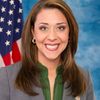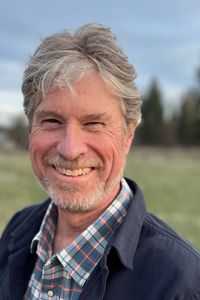Allen Lebovitz
Allen Lebovitz (Democratic Party) ran for election for Washington Commissioner of Public Lands. He lost in the primary on August 6, 2024.
Lebovitz completed Ballotpedia's Candidate Connection survey in 2024. Click here to read the survey answers.
Biography
Allen Lebovitz earned a bachelor's degree from Northeastern University in 1990 and a graduate degree from the Yale School of Forestry and Environmental Studies in 1993. His career experience includes working as an environmental specialist, restoration ecologist, forester, and wildland firefighter.[1]
Elections
2024
See also: Washington Public Lands Commissioner election, 2024
General election
General election for Washington Commissioner of Public Lands
Dave Upthegrove defeated Jaime Herrera Beutler in the general election for Washington Commissioner of Public Lands on November 5, 2024.
Candidate | % | Votes | ||
| ✔ |  | Dave Upthegrove (D) | 52.6 | 1,969,936 |
 | Jaime Herrera Beutler (R) | 47.2 | 1,765,121 | |
| Other/Write-in votes | 0.2 | 8,394 | ||
| Total votes: 3,743,451 | ||||
 = candidate completed the Ballotpedia Candidate Connection survey. = candidate completed the Ballotpedia Candidate Connection survey. | ||||
| If you are a candidate and would like to tell readers and voters more about why they should vote for you, complete the Ballotpedia Candidate Connection Survey. | ||||
Do you want a spreadsheet of this type of data? Contact our sales team. | ||||
Nonpartisan primary election
Nonpartisan primary for Washington Commissioner of Public Lands
The following candidates ran in the primary for Washington Commissioner of Public Lands on August 6, 2024.
Candidate | % | Votes | ||
| ✔ |  | Jaime Herrera Beutler (R) | 22.0 | 419,309 |
| ✔ |  | Dave Upthegrove (D) | 20.8 | 396,304 |
 | Sue Kuehl Pederson (R) | 20.8 | 396,255 | |
 | Patrick DePoe (D)  | 14.1 | 267,944 | |
 | Allen Lebovitz (D)  | 10.2 | 194,118 | |
 | Kevin Van De Wege (D)  | 7.5 | 143,174 | |
 | Jeralee Anderson (D) | 4.4 | 84,353 | |
| Other/Write-in votes | 0.1 | 1,658 | ||
| Total votes: 1,903,115 | ||||
 = candidate completed the Ballotpedia Candidate Connection survey. = candidate completed the Ballotpedia Candidate Connection survey. | ||||
| If you are a candidate and would like to tell readers and voters more about why they should vote for you, complete the Ballotpedia Candidate Connection Survey. | ||||
Do you want a spreadsheet of this type of data? Contact our sales team. | ||||
Withdrawn or disqualified candidates
- Mona Das (D)
- Rebecca Saldana (D)
Campaign finance
Endorsements
Ballotpedia did not identify endorsements for Lebovitz in this election.
Campaign themes
2024
Ballotpedia survey responses
See also: Ballotpedia's Candidate Connection
Allen Lebovitz completed Ballotpedia's Candidate Connection survey in 2024. The survey questions appear in bold and are followed by Lebovitz's responses.
| Collapse all
I’ve spent my life working and playing in forests, on rivers, and the sea and this experience has helped define who I am and what I value. I value healthy lands and waters and I believe we can be better stewards of Washington’s forests, sagelands, rivers and estuaries to provide for a healthy environment and economy for all Washingtonians. I’ve spent over 3 decades working to achieve this vision for Washington and I’m committed to providing the leadership to lead us there. I believe the management of public lands should be informed by science, practical experience and the values of the people of Washington State and public lands should benefit all Washingtonians.
Unlike anyone else to run for Commissioner, I’ve been a professional ecologist, forester, and wildland firefighter for over 30 years. I studied ecology, natural resource management, and public policy in school. I earned a master’s degree at the Yale School of Forestry and Environmental Studies and have continued this learning throughout my career.- My top priority will be to address the root cause of the wildfire crisis by restoring our forest’s and sageland’s natural resilience to fire and climate change. With over 20 million acres of forests and 10 million acres of sagelands that are at risk, we have to recognize we can’t perpetually protect all of it, we need to re-establish these landscape’s natural abilities to resist catastrophic wildfire and the effects of climate change. We can do this with science and practical experience based approaches to restore native forest forests with larger, diverse, fire resistant stands of trees, and in our sagelands, removing invasive grasses and restoring native plant communities.
- We need to develop new goals for the management of our state forests and agricultural lands that establish targets for creating value, not just volume of products produced from them. By focusing on using the trees we harvest and agricultural lands we farm to produce the highest value products, we can increase revenues while managing our lands better.
- I will direct that we manage state lands in ways that build our economies, particularly in rural communities. This will include ensuring a steady and predictable supply of natural resources from to support development of local infrastructure to manufacture products from them. I will also support developing new manufacturing capacity in these communities. Finally, I’ll direct that DNR prioritizes using local workforces to do the work needed on state lands from communities with them in their back yards.
The DNR is the forestry agency for the state and manages 2.1 million acres of state forests in trust for the people of Washington to generate revenue for public schools and other public services, conserve priceless environmental benefits and provide opportunities for the public to enjoy public forests. The DNR also manages another 2.4 million acres of state-owned aquatic lands including much of Puget Sound and most large rivers in the state. It also manages over a million acres of agricultural lands and even commercial real estate. The DNR generates revenue from these lands by producing timber, leasing lands for agriculture and aquaculture, leasing lands for mining, leasing aquatic lands for marinas, leasing lands for other commercial uses, and selling wild geoduck harvest opportunities.
Another critical function the DNR serves is as the state’s firefighting agency, providing fire protection for 13 million acres of forestlands in Washington and supporting many programs for improving wildfire safety in communities and recovery after wildfire.
The DNR plays a regulatory role as well, issuing and enforcing permits for forest practices, burning and smoke management, and mining.
In addition to these roles, the DNR manages numerous recreation areas, conservation areas, and community forests and manages the state’s Natural Heritage program that catalogs the plants, animals, and ecosystems of Washington and prioritize their conservation needs.
The other source of wisdom and knowledge I draw from are the writings of Aldo Leopold, the founder of the discipline of wildlife ecology and modern ecological conservation. He was a forester, philosopher, conservationist, educator, and lover of all things wild and natural. His greatest contribution to conservation was his development of the “land ethic”. As he described it, the land ethic is “when we see land as a community to which we belong, we may begin to use it with love and respect”. This expands the definition of community to include not only humans, but the soils, waters and animals that make up our Earth. It reminds us that the relationship between people and the land are intimately connected and that care for people cannot be separated from care for the land. This is the principle, or ethic, that forms the basis of my approach to environmental management and will guide me in how I serve as the Washington Commissioner of Public Lands.
Note: Ballotpedia reserves the right to edit Candidate Connection survey responses. Any edits made by Ballotpedia will be clearly marked with [brackets] for the public. If the candidate disagrees with an edit, he or she may request the full removal of the survey response from Ballotpedia.org. Ballotpedia does not edit or correct typographical errors unless the candidate's campaign requests it.
Campaign website
Lebovitz's campaign website stated the following:
| “ |
Restoring fire-resilient landscapes and building fire prepared communities As commissioner, I will use the leadership experience I’ve gained to help lead our state beyond responding to the wildfire crisis, to getting ahead of it. I’ll do this by continuing our progress improving wildfire response, but importantly, by accelerating our efforts to restore healthy forests and sagelands that are naturally fire-resilient and investing in communities to become better protected from wildfire. Currently, I serve as the Commissioner of Public Lands’ Wildland Fire and Forest Resilience Liaison, as well as lead the state’s Wildland Fire Advisory Committee and represent the DNR on the state’s Shrubsteppe Restoration and Resilience Initiative. I have the experience to lead our state in getting ahead of the wildfire crisis.
As commissioner, I will direct the DNR to manage state lands to achieve healthier, more productive, and wildfire-resilient forests. We can manage public forests to ensure their legacy for decades to come, while supporting our public schools and economy. As commissioner, I will manage state forests to achieve both. This starts with valuing forests for all the benefits they provide, setting management goals for providing these benefits, and implementing progressive forest practices that focus on producing value from forest management over timber volume. By increasing the DNR’s ability to directly manage forest harvest operations we can protect sensitive habitat and restore our forests’ ability to withstand wildfire and provide vital habitat, while providing a sustainable supply of logs to timber mills. Direct management by DNR of state forests will also increase our ability to secure the greatest value for the timber we do harvest for state trust beneficiaries – our public schools. As an ecologist and forester, I have the practical experience to lead this change.
As our summers grow hotter and drier and our precipitation patterns shift, we must manage our state lands to reduce the threat of wildfire, maintain our water supplies, and ensure that our rivers continue to provide the habitat our fish and wildlife will need to adapt. Over the last decade at DNR, we have developed plans to adapt our natural resource management to a changing environment. As commissioner, I will direct the DNR to accelerate the implementation of these plans, ensuring that we continue to adapt to a changing climate and develop practical solutions to environmental changes as we encounter them. I will also lead the DNR in doing our part to combat climate change, while seizing opportunities to maximize revenues for state trusts and build our economy. We can achieve these things by managing the carbon-storage potential of public lands; the water-conservation potential of our forests; and habitat quality and diversity on those lands.
State lands should support local economies, particularly those with state lands in their back yards. The management of those lands should also maximize benefits to state trusts. As commissioner, I will direct the DNR’s management of our state lands to ensure we achieve this. We’ll focus on a double bottom line, benefiting local economies with state lands in their back yards, supporting local industries adding value manufacturing natural resources, and prioritize local work forces to do the work needed on state lands. I will support the development of this type of innovation and ensure state lands provide consistent supplies of natural resources to companies who add value to those raw natural resources to support their investments in the infrastructure and jobs needed to add value to them.
The Commissioner of Public Lands is responsible for ensuring the benefits of our public lands flow equitably to all residents of our state. It is also the commissioner’s responsibility to direct the DNR to meet the needs of all residents. Furthermore, the commissioner must lead the DNR in meeting its legal and ethical obligations to the Sovereign Tribal Nations of Washington. This will be a priority for me as your commissioner, which starts with listening to residents, especially those who have been underserved. I will direct the DNR to adapt its work to ensure the needs of those residents are met, by including their perspectives in advising and leading the development of DNR programs. Equity will be the standard in our ranks and in our service to the residents of our state, and as your commissioner, I pledge to uphold this principle in every decision I make. [2] |
” |
| —Allen Lebovitz’s campaign website (2024)[3] | ||
Campaign finance summary

See also
2024 Elections
External links
|
Candidate Washington Commissioner of Public Lands |
Personal |
Footnotes
- ↑ Information submitted to Ballotpedia through the Candidate Connection survey on June 27, 2024
- ↑ Note: This text is quoted verbatim from the original source. Any inconsistencies are attributable to the original source.
- ↑ Allen Lebovitz for Washington State Commissioner of Public Lands, “My Priorities,” accessed July 23, 2024
State of Washington Olympia (capital) | |
|---|---|
| Elections |
What's on my ballot? | Elections in 2026 | How to vote | How to run for office | Ballot measures |
| Government |
Who represents me? | U.S. President | U.S. Congress | Federal courts | State executives | State legislature | State and local courts | Counties | Cities | School districts | Public policy |







